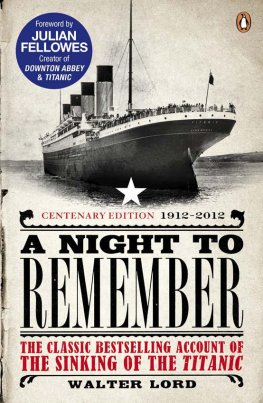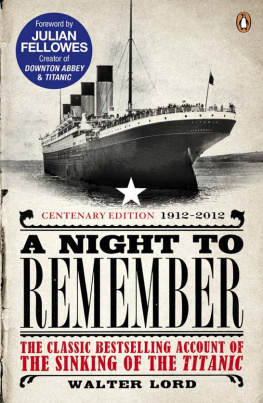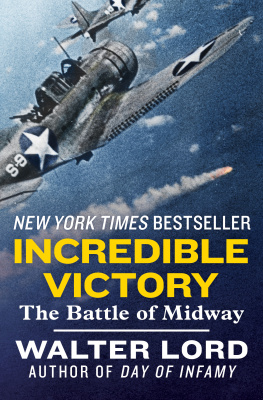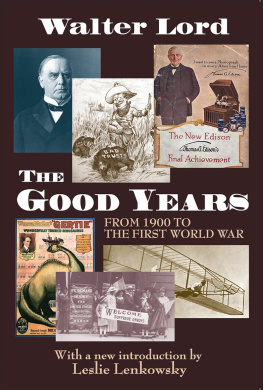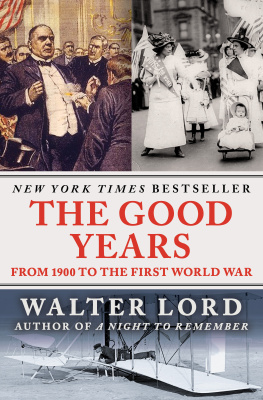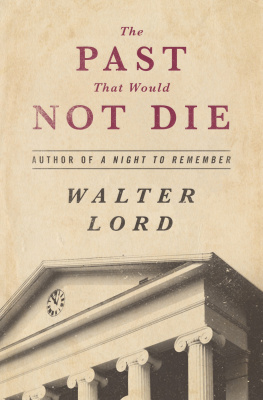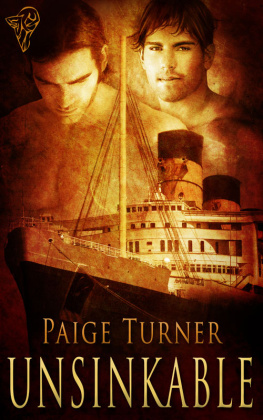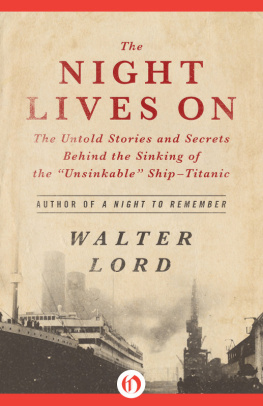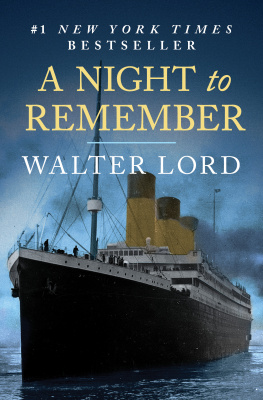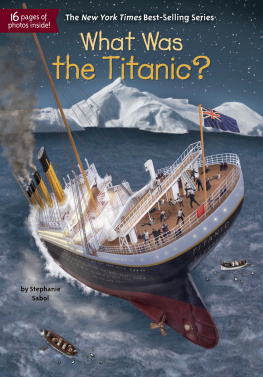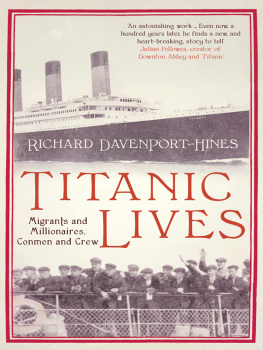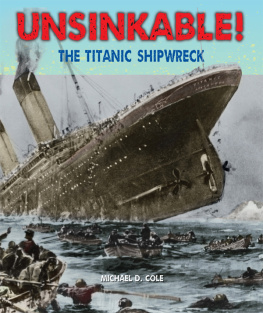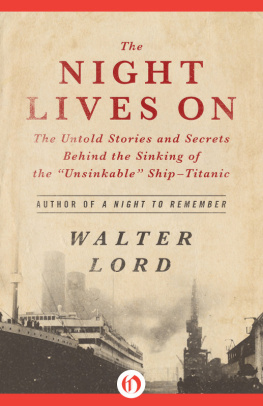Walter Lord
A NIGHT TO REMEMBER
The Classic Bestselling Account of the Sinking of the Titanic
With a Foreword by Julian Fellowes and an Introduction by Brian Lavery
Praise for Walter Lords A Night to Remember

PENGUIN BOOKS
Absolutely gripping and unputdownable.
David McCullough, Pulitzer prize-winning author
Walter Lord singlehandedly revived interest in the Titanic an electrifying book.
John Maxtone-Graham, maritime historian and author
A Night to Remember was a new kind of narrative historyquick, episodic, unsolemn. Its immense success inspired a film of the same name three years later.
Ian Jack,
GuardianDevotion, gallantry Benjamin Guggenheim changing to evening clothes to meet death; Mrs Isador Straus clinging to her husband, refusing to get in a lifeboat; Arthur Ryerson giving his lifebelt to his wifes maid A book to remember.
Chicago Tribune
Seamless and skilful its clear why this is many a researchers Titanic bible.
Entertainment WeeklyEnthralling from the first word to the last.
Atlantic MonthlyA graduate of Princeton University and Yale Law, Walter Lord served in England with the American Intelligence Service during the Second World War. His interest in the Titanic dates back to 1926 when, at ten years old, he persuaded his family to cross the Atlantic on the Olympic, sister ship to the doomed ocean liner. Lord was renowned for his knowledge of the Titanic catastrophe, serving as consultant to director James Cameron during the filming of Titanic. A Night to Remember was published in 1956 and has never been out of print. Walter Lord died in 2002.
Julian Fellowes is an actor, writer, director and producer. His film and television work includes Gosford Park, Downton Abbey and Titanic. His novels include Snobs and Past Imperfect.
Brian Lavery is Curator Emeritus at the National Maritime Museum, Greenwich. He is the author of books including Ship: The Epic Story of Maritime Adventure. He was consultant on the film Master and Commander and the BBCs Empire of the Seas.
Foreword by Julian Fellowes
There are certain episodes in the past which fix like a burr on our imaginations, events in history which will not let us go. They are generally tragic ones: the destruction of Pompeii, the plague and fire in the London of the 1660s, the French Revolution. But few of these outrank that single incident, just a century ago, when a luxury liner, the very acme of its own type and time, struck an iceberg in the North Atlantic at 11.40 on the night of 14 April 1912, and sank just over two and a half hours later, thereby giving birth to books and films and memoirs and articles without number.
It is hard to pin down exactly why this tragedy still haunts us to the degree that it does, when the last of the infant passengers to survive have now gone to their reward. Maybe it is because the ship seemed, even then, to represent that proud, pre-war world in miniature, from the industrialists and peeresses and millionaires and Broadway producers who sat about the vast staterooms in first class, to the Irish and German and Scandinavian immigrants packed into third, carrying with them all they possessed, on their way to a new life in America.
There were the passengers in second class, too, professionals and their wives, and salesmen with samples of wares or order books at the ready, all set to make a deal with the entrepreneurs of the New World. And there was the crew, the boilermen and deckhands, the stewards and stewardesses, and, of course, the officers, who would find themselves at the centre of the drama of the ships final hours. And as they headed for destruction, so did the larger world they represented, which would soon hit its own iceberg in the shape of the First World War.
Walter Lord begins his account of the disaster with a curious fact: in 1898 one Morgan Robertson wrote a novel about a fabulous liner, packed with the rich and fashionable folk of the day, which crashed into an iceberg and sank. The book was called Futility and the events predicted in it would become startlingly true. It seems to have been the discovery of this eerie coincidence that inspired Lord to take on the mantle of Chief Chronicler of the Titanic.
He would have many imitators, but what continues to mark his version apart from the rest is its extraordinary economy. He manages to convey both the detail and the sweep, the little sorrows and the all-embracing horror, in prose which is minutely researched but never dense. His style is serious, moving and, above all, readable. In my own investigation into the truth behind the sinking, I never came across another book to rival it.
The Titanic has spawned its own legends, its own heroes and heroines, but, as so often in life, the truth is a little more complicated. Some of these stars, the famously unsinkable Molly Brown, for instance, or John Hart the third-class steward, or the stalwart Countess of Rothes, prove satisfactorily authentic when they are researched. Mrs Brown did indeed take the oars and try to get the lifeboats to go back for survivors; John Hart did lead parties up from steerage to the boat deck on his own initiative and he did get them away to safety; Lady Rothes did take over the tiller, and corresponded with the sailor in charge of her boat for the rest of their lives.
But then it was Charles Lightoller, second officer, one of the accepted heroes of the sinking, who decided not to fill the boats to capacity, and to take women and children only (rather than the more usual women and children first), his idea being that the men could swim out to join their womenfolk once the boats were safely launched. This doomed plan seems to have been arrived at because Lightoller was unaware that the boats had been tested full in Belfast, and failed to recognize that, after a short time, the hatches from which the men were to swim would be unreachable or that the water was too cold to survive in for more than a few minutes. As it was, the boats rowed away from the wreck as soon as they touched the surface of the sea to escape the suction which never in fact happened.
So while Lightoller definitely was a very brave man and a real hero, his split-second decision not to take men and not to fill all the boats cost hundreds of lives.
I wonder, too, whether some of the villains have been justly treated. History has not been kind to the Duff Gordons, but the charge against them of paying the sailors to keep away from the drowning was never proved. If they were afraid to return for fear of being swamped, it was no more than the fear felt in almost every boat.
And the Managing Director of the White Star Line, Bruce Ismay, has had a hard press when he did not, as one often reads, get into the first lifeboat to leave the ship. In fact, he climbed into the very last boat of any description, one of only two collapsibles to be successfully launched, to get away before the ship went down. Nor is there any solid evidence that he was responsible for the increase in speed, since it was White Stars clear and stated policy that they sold luxury rather than a record crossing. It is not anyway realistic to exonerate Captain Smith from the decision to go faster, as some have tried to do, when the order could not have been carried out, no matter where it came from, without his approval. During those frightful last two hours, Ismay had in fact spent a good deal of the time helping women and children into the boats before the temptation to survive proved too much for him. I wonder if his subsequent title, The Coward of the

